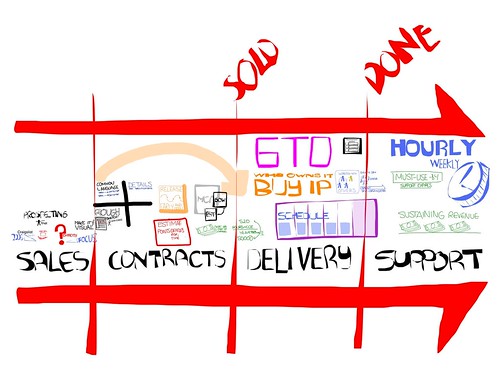The following guest post was written by Carlo Pandian. The author’s views are entirely his own and may not reflect the views of FreelanceCopywritersBlog.com. If you are interested in producing a Guest Post for this blog, please get in touch with your ideas.

Working for yourself is one of those things that can seem like a good idea at the time. However before taking the leap into self-employment it’s worth planning ahead. There is a great range of resources online from both local and national government to help you get started and it’s worth considering the following issues.
Attitude matters
Successful businesses of any size rely on their people to create that success. So before starting out it’s important to decide if you have the right qualities to run your one man business.
- You’ll need to be prepared to make some sacrifices, particularly in the early days. This can include cutting back on your expenses, holidays and free time. If you have a family this latter can be a big issue (or it can become one) so consider the impact it will have not only on you, but the rest of the family.
- Common sense and a sense of humour. You’ll need both of these in relatively large amounts to start off with. No amount of business studies courses or management technique manuals can replace either. That’s not to say they don’t have their uses, but sometimes a little common sense and the ability to laugh (usually at yourself) will make life a lot easier.
- Do you have experience of running a business? Even if this is at management level in somebody else’s firm. This is crucial if you are looking for bank loans or grants and will smooth the path to finding finance if you need it.
- Management skills and people skills. You will need both of these if you plan to run your own firm. If you are starting out as self-employed you may think you won’t have staff to manage, however, there will be you. In this sense simple things like time management skills are essential. People skills are essential for dealing with clients and suppliers, and will come in handy when you do start to employ other workers.
Practical tools
Most businesses today believe that a website is an essential tool for their firms. To a large extent this is true although, depending on the type of business you run, it may not be crucial to start out with. However, in the long term it offers visibility to a vast range of potential customers and it’s also largely expected by consumers these days.
Premises, again this will depend very much on the type of firm you run. The key is to find appropriate premises in the best location you can. If a cupboard under the stairs will do, then go for it, but if it’s a shop, office or manufacturing premises that you need then don’t stint on the cost if at all possible. A High Street location will repay the investment in the way a back street one simply won’t. By the same token a pre-cast concrete firm does not normally suit a narrow, residential street. Think sensibly and then rent or buy the best premises you can.
Most computer software can be sourced in cloud format these days from data and document storage to online bookkeeping and accounting software. The latter is one thing you can’t afford to be without and you should ensure you have good software in place, as well as an accountant. Both may seem an unnecessary expense, when starting out, but it’s essential to keep the books in order from day one if you are not to fall foul of the dreaded HMRC. If you need advice on this contact either the dreaded HMRC (they’re actually quite nice and very helpful) or Business Link.
From accounting software to the ability to laugh at yourself there are a range of practical tools and skills you’ll need to run your own business. Preparation is normally the better part of valour before setting up on your own, but with the right attitude it can be the most rewarding lifestyle of all.
About the author: Carlo Pandian is a business graduate and freelance writer. He blogs about freelance work, personal development and technology covering everything from QuickBooks Online accounting software to Android apps. Aside from his daily job, he loves reading great entrepreneurs biographies and writing payroll software manuals for small businesses.






1 comment so far ↓
Great tips! Thank you for sharing this.
Leave a Comment